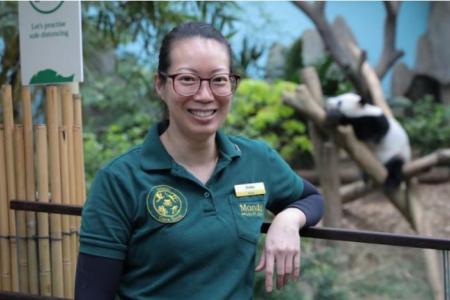Caring for pandas helps keeper on her own parenting journey
Like an attentive parent, animal care officer Trisha Tay has been closely watching over the giant pandas Jia Jia and Kai Kai since they arrived here in September 2012.
She knows their quirks intimately. Take Jia Jia, now 13, for example.
"She has a personality of her own, very sensitive and aware of who is working with her. For keepers who are new and not close to her, she'll try to bully them by doing little things that make life difficult," said Ms Tay, who has been with Mandai Wildlife Group (MWG) since 2011.
As for Kai Kai, who is 14 years old, he is like the average human male. "Kai Kai is a bear that is very food-motivated. So he doesn't really bother whether you are very close to him or you have worked with him for very long - as long as you have food, he will listen to you and he will follow you," she said.
The 38-year-old has bonded with them over the years but observing them brought her a surprising benefit.
"Before I had kids, I remember telling people that being a panda keeper trains you for parenthood.
"As pandas need to be fed multiple times a day and take naps between each feed, it's kind of like caring for little babies that need to be fed every few hours," said Ms Tay, who has two children aged five and seven.
"Knowing that every animal has a different personality, and will need a different approach to being conditioned, reminds you that kids are all different and we also need to tweak things to suit each kid," she said.
So when the pandas had a cub in August this year, she tapped her own experience with baby monitors.
"The first thing I do when I wake up in the morning is to check the closed-circuit television camera (CCTV) footage, to see how Jia Jia and the cub are doing, before leaving for work, even on my days off," said Ms Tay, who volunteered at the Singapore Zoo when she was 15 years old and even contemplated leaving junior college to work there full-time.
"I have to check the baby cam on my laptop over and over again just to make sure that things are going well."
Jia Jia is doing much of the caring for the cub, but Ms Tay and her team check that she is nursing and cleaning the cub.
The animal carers help by cleaning the den and giving the giant panda some respite and access to her exhibit space at River Wonders while they look after the cub, which has yet to be named.
They take care of the mother, so she can care for the cub.
"We feed her multiple times a day, make sure she eats well and rests well. And when we're done for the day, before I go to bed, I'll check the CCTV again to make sure that she's fine for the night," added Ms Tay, who has worked with a variety of animals including primates and reptiles, but whose main interest is in big carnivores.
The team at MWR started work on getting the pandas to mate from 2015.
They tried different strategies including artificial insemination, since Kai Kai was the only male panda available to them, unlike in China where another male panda may be recruited.
"That's when we were unable to apply for long stretches of leave, as we needed to monitor her around the clock," said Ms Tay, whose husband is the assistant curator of great apes, herpetology and invertebrates at Mandai Wildlife Group. Herpetology is the study of amphibians and reptiles.
The group was formerly known as Wildlife Reserves Singapore (WRS) and manages the Mandai Wildlife Reserve which comprises the Singapore Zoo, the Night Safari, the Jurong Bird Park and the River Wonders in Singapore.
Of her husband, she said: "Being in the same line of work definitely helps us in managing home and work life together."
Ms Tay and her team took part in conferences and tapped the experiences of her counterparts in zoos overseas to learn more about giant panda breeding.
"We used WeChat to communicate with the experts from China. By exchanging videos that we shot, we learnt about the birthing process for pandas as well as their post-partum care so that we would be ready when the time came for Jia Jia to give birth."
On Aug 10 this year, a WRS veterinarian saw a clear outline of a foetus with a strong heartbeat during an ultrasound scan.
"I was off the day we first found out that Jia Jia was pregnant and I was actually busy with my kids when I got the notification in the team's group chat.
"I was definitely in shock and disbelief," said Ms Tay, who added that her team was on standby for round-the-clock shifts.
"Things started sinking in when calls started coming in about the imminent birth. We had a lot of logistical and staffing issues to settle while liaising with all stakeholders involved."
The pink and hairless cub, which was smaller than a 500ml water bottle at birth, was born on Aug 14.
Ms Tay said that like human babies, he just sleeps a lot. "He does get up once in a while and try to learn how to crawl about... I would say he's maybe a bit laid-back in terms of how he is with Jia Jia, so maybe he takes after the father a little bit?"
WRS said in August that it had been in talks with the authorities in China to extend the 10-year loan of Jia Jia and Kai Kai for another term. China also requires the cub to be sent to the country to take part in its national breeding when it reaches two years of age.
"It's a privilege to take care of giant pandas," said Ms Tay, who is aware that they will eventually have to return to China.
"Right now, I'm not thinking that far ahead. Watching the cub grow from a little baby to two years old, I'm sure that I'll be pretty sad and attached to him by then."
WATCH All eyes on the "little one". https://str.sg/panda1
Get The New Paper on your phone with the free TNP app. Download from the Apple App Store or Google Play Store now


